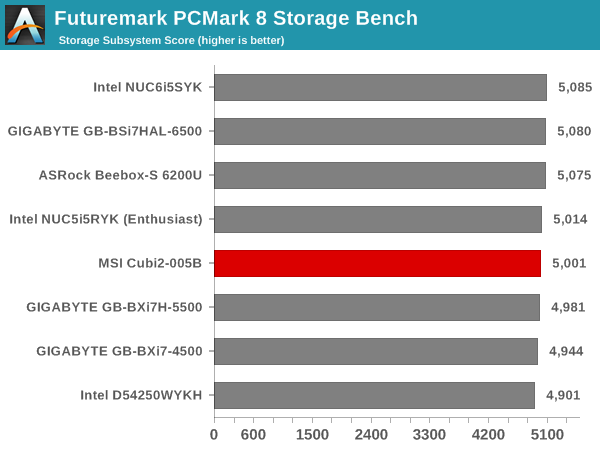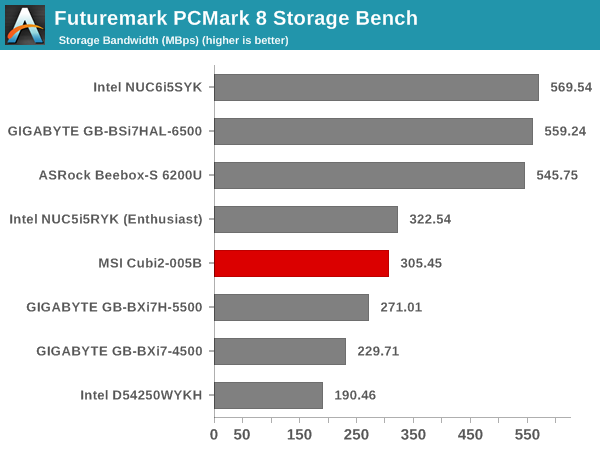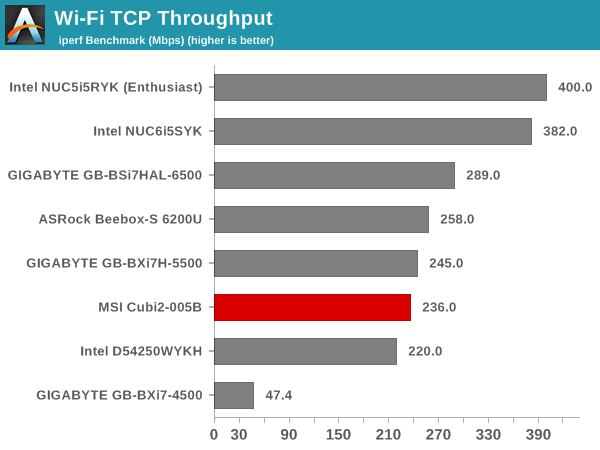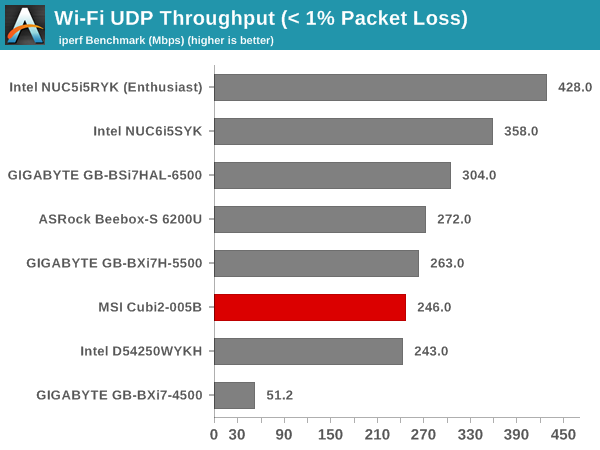MSI Cubi 2 Kaby Lake UCFF PC Review
by Ganesh T S on December 30, 2016 3:30 PM ESTNetworking and Storage Performance
Networking and storage are two major aspects which influence our experience with any computing system. This section presents results from our evaluation of these aspects in the MSI Cubi2-005B. On the storage side, one option would be repetition of our strenuous SSD review tests on the drive(s) in the PC. Fortunately, to avoid that overkill, PCMark 8 has a storage bench where certain common workloads such as loading games and document processing are replayed on the target drive. Results are presented in two forms, one being a benchmark number and the other, a bandwidth figure. We ran the PCMark 8 storage bench on selected PCs and the results are presented below.


The 2.5" SATA SSD makes the Cubi2-005BUS come in the lower half of the storage benchmarks order (since most of the other PCs are using a NVMe SSD). However, the score (5001 vs. 5085 for the pack leader) shows that most consumers with office and gaming workloads do not have much to gain by going for a NVMe SSD compared to a SATA SSD.
On the networking side, we restricted ourselves to the evaluation of the WLAN component. Our standard test router is the Netgear R7000 Nighthawk configured with both 2.4 GHz and 5 GHz networks. The router is placed approximately 20 ft. away, separated by a drywall (as in a typical US building). A wired client is connected to the R7000 and serves as one endpoint for iperf evaluation. The PC under test is made to connect to either the 5 GHz (preferred) or 2.4 GHz SSID and iperf tests are conducted for both TCP and UDP transfers. It is ensured that the PC under test is the only wireless client for the Netgear R7000. We evaluate total throughput for up to 32 simultaneous TCP connections using iperf and present the highest number in the graph below.

In the UDP case, we try to transfer data at the highest rate possible for which we get less than 1% packet loss.

The 1x1 nature of the WLAN component (Intel AC3168) results in lower Wi-Fi performance compared to the PCs with 2x2 radios. Internal antenna placement and orientation also has an effect on these numbers.










32 Comments
View All Comments
MrSpadge - Friday, December 30, 2016 - link
First paragraph:"The Kaby Lake-U (KBL-U)series with 15W TDP CPUs was introduced along with the 4.5W Kaby Lake-Y ones in Q3 2014."
You mean Broadwell here instead of Kaby Lake, don't you?
ganeshts - Friday, December 30, 2016 - link
bad typo, with the link in it correctly linking to the Q3 2016 article. It has been fixed.Voldenuit - Friday, December 30, 2016 - link
No tear down? Cooling system? System layout? Noise measurements?Great_Scott - Friday, December 30, 2016 - link
It doesn't really matter anyways.This kind of system is a waste of time: laptops have greater functionality for less price, and the same components. The U-series doesn't distinguish between the i5 and i7 beyond clock speeds.
You can go to any site online and get a U-series laptop for ~$400 US that also includes RAM and Storage.
barleyguy - Saturday, December 31, 2016 - link
For an HTPC, a NUC or UCFF is a lot more convenient than a laptop. They generally have less fan noise, fit in less space, and boot up with the TV (or projector) as the primary monitor.(I'm typing this on a Zotac Z-Box in my living room.)
That said, I'm really skeptical of the U-series processors in general. My Z-Box has an i5-4200u, and I've had some issues with throttling under load. Hopefully they've improved from the 4200u to the 7500u.
kmmatney - Monday, January 2, 2017 - link
and the laptop will have an OS as well...milkod2001 - Tuesday, January 3, 2017 - link
and it also has screen, keyboard and tracking device to start with and usually cost much less.I can only see good use of NUCs if the cheapest & crappiest NUCs are considered to buy to replace Intel P4 10 years old machines with existing monitors, keyboards and mice. For anything else: laptop is much better solution unless you need to Vesa mount your computer on telly.
niva - Tuesday, January 3, 2017 - link
I don't know about all that, please show me the laptop with a Kaby Lake "i7" chip and comparable specs that really stacks up to this NUC and obsoletes it.I think these boxes are ideal for installing linux on it, paying for a windows license when buying a laptop really irks me anyways so that's money down the drain too. I just bought an Acer Aspire E 15 from Amazon for $350 but that thing had a terrible drive in it, an i3-7100U, and only a single stick of 4GB RAM. Of course I had an old SSD from my previously dead laptop I could put in and I dumped linux on it which is fine with 4GB of RAM at this point, but you guys are seriously ignoring some of the components thrown into this NUC.
BrokenCrayons - Tuesday, January 3, 2017 - link
*shoulder taps* Psst, from one Linux user to another, Windows licenses are not a waste because close to or over 99% of laptops that ship with Windows end up as ....*drum roll*... Windows latops.As far as your Acer's sad configuration is concerned, welcome to the wonderful world of budget computers. You got what you paid for. If you want better new hardware, you'll have to dig a little deeper into the wallet.
ganeshts - Friday, December 30, 2016 - link
You guys are hard to please. In any case, this is a bog standard NUC, nothing special about it.Cooling system - all that matters is effectiveness, and I hope readers agree when I say that we have the most comprehensive evaluation of the effectiveness of the cooling solution of mini-PCs in the review circuit. Look at the graphs in the 'Power Consumption and Thermal Performance' section.
Noise measurement - we only do subjective eval in these reviews. Providing noise numbers for these types of PCs (i.e, non gaming mini-PCs) is pretty much useless because the noise floor is too high and these types of PCs are too quiet in our evaluation setup. Creating a noise measurement lab is not worth the investment for the number of PC reviews that I do per year. You can find dedicated guys like SPCR ( Silent PC Review - http://www.silentpcreview.com/ ) who fill that market niche with excellent reviews and articles. (I would imagine even they would not find the Cubi 2 and other similar PCs interesting enough to do noise measurements)